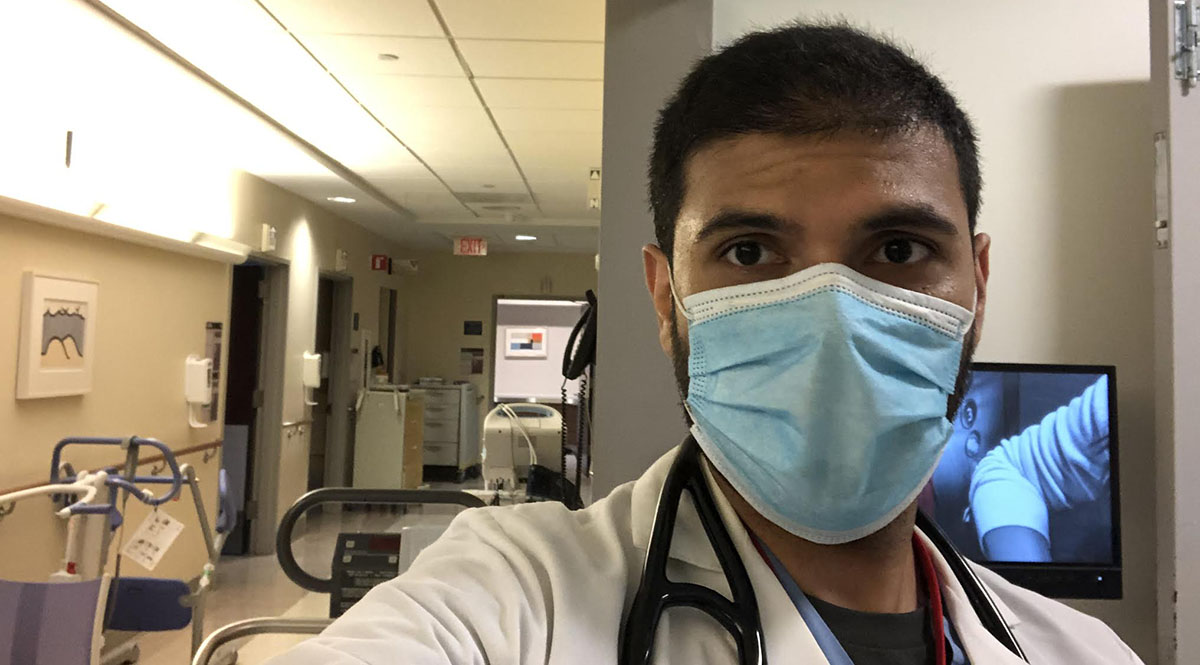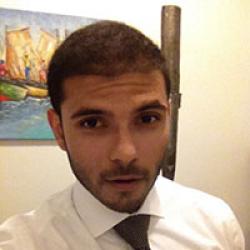
“Do you regret going into medicine?” read a text from a former co-worker within the first few weeks of the COVID-19 pandemic.
At the time, I had been in medical school for only about eight months, having recently transitioned out of a consulting job in the financial services industry. I had grown into that role after graduating from college with a degree in biology and psychology and, before I left, was managing revenue systems and clinical data repositories for pharmaceutical companies. But ultimately, my growing interest in patient engagement and advocacy — coupled with my desire to do research in the neurobiology of addiction — had motivated me to switch careers and pursue a physician-scientist track in my early 30s.
Only newly separated from my network of co-workers, the pandemic triggered a slew of “check-in” text messages: Was I doing all right? Did I think it was poor timing? Was I scared? Was it worth it?
The short answer was yes, it felt entirely worth it, and no, I had no regrets about going into medicine despite being in the thick of a raging pandemic. On the contrary, seeing the unwavering dedication of front-line responders and their commitment to patient care felt even more inspiring, invigorating, and gratifying.
Around the same time, I found myself becoming more active on Twitter — connecting with other medical students across the country about how their schools were responding to the intensifying pandemic. As lockdowns loomed, streets emptied out, ambulances blared, and hospitals overflowed, we organized to help with personal protective equipment shortages, facilitate COVID-19 testing, or provide child care for health care workers. As medical education as we knew it came to an abrupt halt, we quickly adapted to a virtual environment. Despite so many uncertainties, I still remember being vocal on Twitter about how grateful I was to have changed careers, and I actively encouraged others to make the switch if they had been seriously contemplating a career in medicine.
Within a few weeks, messages started pouring into my inbox. People from various walks of life — attorneys, high school teachers, advertising professionals, even a bartender — wanted to know how I’d transitioned into medicine from another career.
At first, I wondered if this outpouring of interest was a knee-jerk reaction to the pandemic — an awareness of the toll of physician shortages on patient care, the tragic loss of lives, a health care system overwhelmed by tens of thousands of critically ill patients. But the more I connected with them, the more I realized that many had been mulling a career change for years, feeling stuck in their jobs or wanting to do something more meaningful. Overlying this baseline interest, however, feeling helpless in the middle of the pandemic when thousands of Americans were dying daily had certainly catalyzed wanting to take the next step. The impact of COVID-19 particularly on communities of color, coupled with pervasive language barriers and thwarted access to care, further inspired people to seriously consider a career switch.
“What’s been holding you back?” I asked them. Unsurprisingly, many of the deterrents they described were similar to those I had experienced prior to my own career transition: Where and when to begin the process. How to navigate prerequisites. How to prepare for the MCAT® exam. How to finance medical school. How to start or support a family while in training. And importantly, how to explore another career option while still maintaining a job and not ruffling any feathers.
I admit to having to maintain discretion at my previous workplace while preparing for medical school. Even though I am unsure of what the reality would’ve been, I worried whether the company would continue to invest in me if they found out that my investment in them was compromised. However, every workplace is different, and I encourage people to use their own judgment when deciding whether to loop their employer in about exploring a different career.
The question of “where to even begin?” came up frequently, and I often share my personal story. For me, once I’d decided that I wanted to go to medical school, I signed up to attend one of the AAMC Virtual Medical School Fairs. There, I learned about an organization called the National Association of Advisors for the Health Professions (NAAHP) and, through their volunteer mentoring program, was paired with a local premed advisor who worked with me extensively. He was one of my biggest advocates through the entire process, not only helping me navigate prerequisites but also reading through numerous drafts of my personal statement and prepping me for interviews. It was important for me to go to an LGBTQ-inclusive school that emphasized social and structural determinants of health and took racial justice in medicine seriously. I was also interested in being on an urban campus and having the ability to work with a diverse patient population — especially immigrants from Southeast Asia. My advisor from the NAAHP mentoring program was instrumental in helping me find schools that met my specific interests.
Additionally, even though I had been out of college for nearly seven years, I reached back out to my college’s prehealth advising staff to see if there were additional resources they could offer or how to fulfill the medical school prerequisites. Fortunately, I didn’t have to do a postbaccalaureate program to complete the premed requirements. However, that route is becoming fairly typical for nontraditional students, and premed advisors are well-equipped to help navigate those decisions.
Beyond the logistics and putting together all the application materials, preparing for the MCAT exam while working full time in a corporate firm was a huge personal undertaking. Recognizing the extent of my job responsibilities, I knew that a three-month preparation time would not cut it. Instead, I gave myself six months to prepare — doing flashcards on my phone during my one-and-a-half-hour commute each way and spending two to three hours every evening watching videos from the Khan Academy. On the weekends, I had a lot more time to study and directed my focus toward the AAMC question banks and practice tests. While a lot of people invest in test prep crash courses, I knew I couldn’t make that work with my job schedule — along with the fact that a jampacked series of lectures wouldn’t align with my learning style — so it wasn’t something I pursued. My advice to people on Twitter has been that it’s worthwhile to look through all the MCAT test preparation materials that the AAMC offers. If people need something more structured, then the test prep courses could be worth revisiting — with the caveat that they can often be cost-prohibitive.
I would also be remiss if I didn’t admit that concerns around income and supporting a family were constantly at the forefront of my mind. I knew that starting a program in my 30s would mean training through most of my 30s and not having a steady job until I was in my early to mid-40s. Despite these concerns, I was extremely lucky to have a partner who encouraged and supported me. He, too, is intimately aware that starting a family for a queer couple is complicated and that raising children in New York City requires substantial means. While we still don’t have all the answers, we decided that we would figure it out along the way.
As I now enter my third year of medical school, I find myself more in love with medicine than I had ever imagined. Getting to the hospital at 5 a.m. to prepare for rounds or going in on the weekends to check on patients doesn’t feel like an inconvenience. On the contrary, it is an honor to be part of my patients’ lives and help them during their most vulnerable moments. I think back on all the doubts and hesitations I had — along with the constant second-guessing of whether I’d ever be good enough to be a doctor — and I feel such gratitude for how incredible this journey has been.
Some people in medicine ask me: If I could do it all over again, would I have still chosen to work in corporate America or go straight through to medical school? While the answer is not black and white, my job taught me numerous skills — how to communicate, how to manage people, how to strategically frame decisions — and I often apply those skills directly to patient care. But working full time and contemplating medical school can also feel daunting, uncomfortable, and inaccessible. I’ve been there, which is why, when my Twitter followers reach out to me — citing the pandemic as an inspiration for pursuing medicine yet worrying about the practicalities of a career transition — I share my personal journey while encouraging them to make their own decisions about when to apply, what to disclose, and how to prepare. For me, medicine has given my life meaning, purpose, and sheer joy, and I wouldn’t have it any other way.
